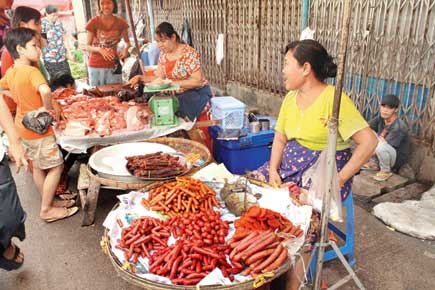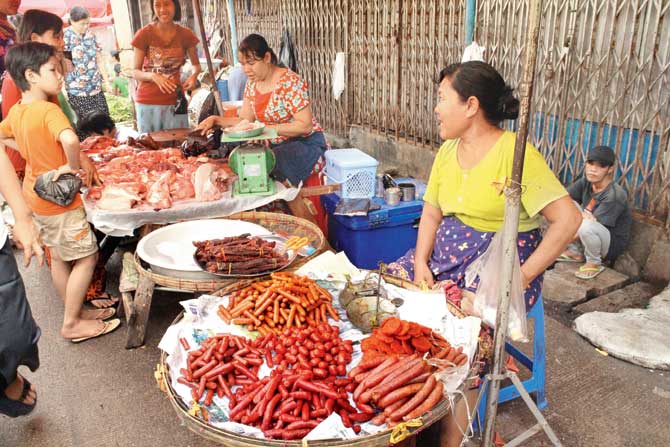It is liberating to see women out and about in Myanmar, where the right to be in public is not solely a male privilege


ADVERTISEMENT

Women at a local market in Yangon, Myanmar. Pic/Rosalyn D’Mello
Yet, it seems almost impossible to imagine a scenario like this back home in India, in any city, Delhi, Guwahati, Chennai or Mumbai. Can you conceive of a stewardess on a Paulo night bus from Mumbai to Goa handing you beverages, making sure all is fine, and interrupting your sleep every three hours to inform you that the bus is stopping for 10 minutes so you can use a restroom that is so impeccably clean it makes us Indians seem like a filthy, grimy lot? And when you do stop, mid-way, to grab a meal, you find it is being cooked by a band of women. From what I’ve witnessed in Yangon and Bagan, the men are around, for sure. But the women are too, and you will see them doing all the things men do, even loiter. I’m too much of an outsider to determine the relative degree of emancipation felt by the women here, but I’m enough of an observer to know it far outweighs anything I’ve experienced back home.
In these nine days, not once have I been stared at lasciviously, not once have I been catcalled or ‘eve-teased’ or been at the receiving end of an unwelcome touch. I have been treated with nothing but respect and dignity. It seems like a stark contrast even to Dhaka, where I spent almost a month in February, and where I could literally count on my fingers how many women there were on a crowded street compared to the seemingly infinite number of men. I have come to realise that I love feeling invisible like this. It’s like I’ve worn some magical cloak and suddenly no one can see me unless I want them to. And what I’m dreading when I return to Delhi is that this cloak will be ripped off the second I exit the airport. I’m already anticipating the reverse culture-shock I felt when I’d returned from my 10-day trip to Japan two years ago and was absolutely horrified by how aggressive and impolite we Indians can be.
I suppose that centuries of patriarchy have bred in us as a society such deep-seated misogyny that it will take the women’s movements decades still to undo. At the heart of it is this collective disbelief in the very concept of a woman as a fellow human being, who has the right to dignity and freedom. We imagine notions of development and economy with little thought to what it means for women. When I returned from my trip to the Parvati Valley, one of the first things I did online was add my signature to a petition conceived by Bangalore-based Vasudeva Sharma asking Nitin Gadkari, Minister of Road Transport and Highways, to build safe and clean highway toilets for women. Although the 16-hour ride from Buntur to New Delhi was in a fairly luxurious bus, with reclining seats and decent leg space, my bladder felt tortured because the random stops at night were in abandoned fields and even though I was carrying a packet of pee buddies (a portable female urination device) I didn’t want to risk becoming a statistic. Sharma was himself appalled by how his female friends and relatives had to “hold it in” during bus trips particularly, because bus drivers either wouldn’t stop, or when they did, did so at really pathetic loos with questionable hygiene standards. Our lack of consideration for the comfort of women is so pathetic; we cannot be bothered to ensure a lessened risk of a urinary tract infection (UTI). “What is the point of futuristic highways and smart cities if women can’t use these highways?” Sharma asks in his petition that has received about 98,585 supporters, but which still needs at least 51,415 to reach its target of 1,50,000. (Please sign it right now!)
Personally, I’d like to start a petition to find out exactly what’s happening with all the money that’s being collected under the Swachh Bharat cess, which, ever since it was instituted, makes me feel even more exploited as a tax-paying woman citizen. Will Indian women ever see acche din?
Deliberating on the life and times of Everywoman, Rosalyn D’Mello is a reputed art critic and the author of A Handbook For My Lover. She tweets @RosaParx. Send your feedback to mailbag@mid-day.com
 Subscribe today by clicking the link and stay updated with the latest news!" Click here!
Subscribe today by clicking the link and stay updated with the latest news!" Click here!






